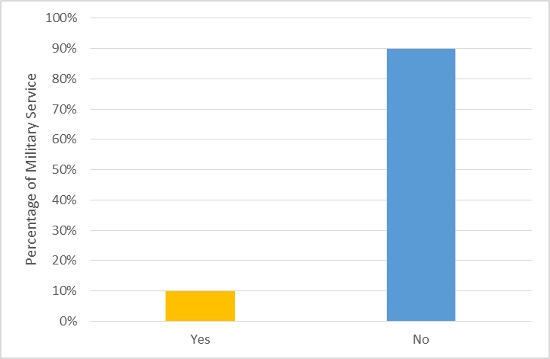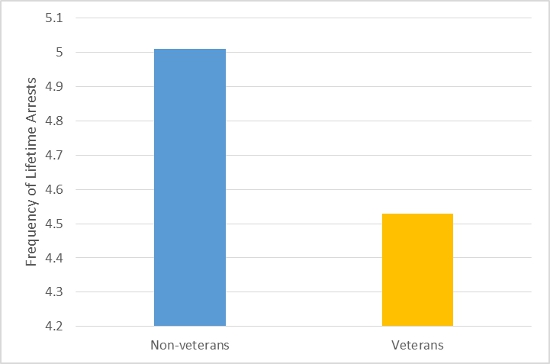
 About 13 percent of Americans have served in the military at some point in their lives, an experience which research has shown is beneficial for people’s educational and employment opportunities. Erika J. Brooke and Jacinta M. Gau explore the effects of military service on veterans’ involvement with the criminal justice system, finding that among prison inmates, military service is linked to fewer lifetime arrests, with those that served longer having fewer arrests.
About 13 percent of Americans have served in the military at some point in their lives, an experience which research has shown is beneficial for people’s educational and employment opportunities. Erika J. Brooke and Jacinta M. Gau explore the effects of military service on veterans’ involvement with the criminal justice system, finding that among prison inmates, military service is linked to fewer lifetime arrests, with those that served longer having fewer arrests.
Service in the military is an important event that shapes the lives of the men and women who serve. Research has shown that participation in the armed forces is beneficial for some in terms of educational and employment opportunities. Studies have also found that service, particularly combat experience, is associated with increased risk for alcohol and substance abuse, mental illness, and antisocial behaviors. However, it remains unclear whether service places veterans at elevated risk for criminal justice involvement.
Many studies examining the association between military participation and criminal behavior lack consistency among variables, especially crime measures (e.g., arrests, offense type), and the number of studies remains relatively low. Additionally, the majority of the research has examined participation only as a dichotomous variable (i.e., yes/no) and does not consider the specific components of the military experience, such as combat exposure, branch type, or length of service, that might affect the impact that service has upon veterans.
As a whole, the literature remains divided, as some researchers have argued that military experience has a crime prevention effect, while others disagree. But for the most part, the research on service and arrest likelihood reveals that participation in general provides a benefit for most who served. However, it is still unclear which aspects of the military act to reduce the chance of offending.
In order to provide a clearer picture of the association between military participation and criminal justice outcomes, we examined the service/arrest relationship among a large sample of US state prison inmates. We improved upon prior research by testing for the potential impact not only of military service, but also age of entry, length of service, combat exposure, discharge type, and branch status on lifetime arrests.
As Figure 1 shows, approximately 10 percent of inmates reported military service. This is slightly lower than the rate (13 percent) among the general population of US adults, which aligns with earlier research, suggesting that veterans overall are less crime involved than non-veterans are. Veterans also had slightly fewer lifetime arrests than non-veterans (means of 4.53 and 5.01, respectively) as displayed in Figure 2.
Figure 1 – Comparing Military Service among US State Prisoners

Figure 2 – Comparing Lifetime Arrests among US State Prisoners

Regression results showed that, among prison inmates, military experience was related to fewer lifetime arrests. Among inmates with military experience, only length of service appeared to relate to the number of arrests, with those serving longer having fewer arrests. The remaining elements of service (age of entry, combat exposure, branch type, and discharge status) were not statistically significant and thus appeared to have no impact on the number of lifetime arrests reported by incarcerated veterans.
Our research supports three main conclusions: 1) entering the military may be beneficial in steering away at-risk youth and young adults from crime, 2) time spent in the military may facilitate stronger ties to society, and 3) combat experience does not appear to be a risk factor for increased frequency of criminal offending. Most importantly, our study suggests that the variation in service experiences can influence criminal behavior, and therefore, future research into the military/crime association should account for these differences.
This article is based on the paper, ‘Military Service and Lifetime Arrests: Examining the Effects of the Total Military Experience on Arrests in a Sample of Prison Inmates’, in Criminal Justice Policy Review.
Featured image credit: The U.S. Army (Flickr, CC-BY-2.0)
Please read our comments policy before commenting.
Note: This article gives the views of the author, and not the position of USAPP – American Politics and Policy, nor the London School of Economics.
Shortened URL for this post: http://bit.ly/1RQb5zH
_________________________________
 Erika J. Brooke – University of Central Florida
Erika J. Brooke – University of Central Florida
Erika J. Brooke recently completed her doctorate in Public Affairs with a concentration in Criminal Justice at the University of Central Florida. She is currently an Instructor for the Department of Criminal Justice at the University of Central Florida and a Commissioned Officer in the U.S. Army Reserve. Her research interests include military service and crime, correctional policy and treatment, drug use and abuse, and veteran courts.
 Jacinta M. Gau – University of Central Florida
Jacinta M. Gau – University of Central Florida
Jacinta M. Gau is an Associate Professor in the Department of Criminal Justice at the University of Central Florida. Her research focuses on policing, with an emphasis on race, procedural justice and police legitimacy, and police-community relations. Her work has appeared in multiple journals.



